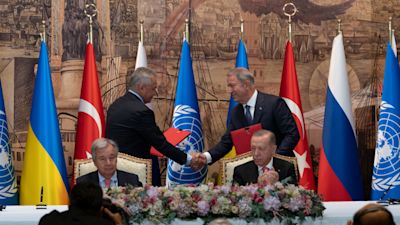Ukraine and Russia sign separate deals to resume grain exports

Global Security Editor Rohit Kachroo reports on the highly-anticipated deal
Russian and Ukrainian officials have signed a pair of twin deals brokered by Turkey and the UN to resume much-needed grain exports.
The two countries signed two separate agreements with Turkey and the UN as they currently refuse to engage directly with each other.
It is hoped the deal will lead to Ukraine being able to export 22 million tons of grain and other agricultural products that have been stuck in Black Sea ports due to the war.
Grain prices have fallen by 2% since Thursday when it was first announced the two sides were close to a deal.
UN Secretary-General Antonio Guterres described the deal as "an agreement for the world" at the signing ceremony in Istanbul.
Turkish President Recep Tayyip Erdogan, who was also at the signing ceremony, has played a critical role in brokering the deal.
Mr Erdogan said: "We are proud to be instrumental in an initiative that will play a major role in solving global food crisis that has been on the agenda for a long time."Turkey plays a key role in managing exports in the region as it controls the Dardanelles and Bosphorus Straits which is the only sea route out of the Black Sea.
It has also attempted to act as a mediator between the two sides during the conflict.
Russian Defense Minister Sergei Shoigu and Ukraine’s infrastructure minister, Oleksandr Kubrakov signed the twin deals on behalf of their countries.
Ukrainian and Russian military delegations reached a tentative agreement last week on a UN plan that would also allow Russia to export its grain and fertilisers.
Mykhailo Podolyak, an adviser to Ukraine’s president, stressed that Ukraine and Russia would only sign separate agreements.
"Ukraine does not sign any documents with Russia," Podolyak wrote on Twitter, adding that his country would sign an agreement with Turkey and the UN, with Russia signing a separate "mirror agreement."
Ukraine is one of the world’s largest exporters of wheat, corn and sunflower oil, but Russia’s invasion of the country and naval blockade of its ports have halted shipments.
Some grain is being transported through Europe by rail, road and river, but the prices of vital commodities like wheat and barley have soared during the nearly five-month war.
The deal will alleviate immediate pressures on the global food market but with the war still raging there are fears many of Ukraine's farms will be unable to plant their next crops.
Want a quick and expert briefing on the biggest news stories? Listen to our latest podcasts to find out What You Need To Know..
With many farms destroyed by shelling and thousands of farm hands signed up to fight in the conflict, there could be a drastic reduction in the amount of food Ukraine can produce.
The lack of exports has already led to a crisis in many nations that rely on Ukrainian grain.
In Kenya, the International Rescue Committee (IRC) says more than 18.4 million people “are already on the verge of starvation, about half of them children”.
In Nigeria, breadmakers went on strike after soaring production costs left many bakeries operating at a loss.
Several other countries in Africa have also experienced similar difficulties.
This is being driven by a drought in the country and also a lack of grain imports.
The deal signed on Friday makes provisions for the safe passage of ships.
It foresees the establishment of a control centre in Istanbul, to be staffed by UN, Turkish, Russian and Ukrainian officials, to run and coordinate the process, Turkish officials have said.
Ships would undergo inspections to ensure they are not carrying weapons.
Implementing this deal in practice may be difficult, as Senior International Correspondent John Irvine explains
Mr Podolyak insisted that no Russian ship would escort vessels and that there would be no Russian representative present at Ukrainian ports. Ukraine also plans an immediate military response "in case of provocations," he said.
Mr Guterres has been trying to reach a deal with the two countries since April.
He proposed a package deal in early June amid fears that the war was endangering food supplies for many developing nations and could worsen hunger for up to 181 million people.
Russian and Ukrainian officials have blamed each other for the blocked grain shipments.
Moscow accused Ukraine of failing to remove sea mines at the ports to allow safe shipping and insisted on its right to check incoming ships for weapons.
Ukraine has argued that Russia’s port blockade and launching of missiles from the Black Sea made any shipments unviable.
Ukraine has sought international guarantees that the Kremlin wouldn’t use the safe corridors to attack the Black Sea port of Odesa.
Ukrainian authorities have also accused Russia of stealing grain from eastern Ukraine and deliberately shelling Ukrainian fields to set them on fire.
The US welcomed the agreement but State Department spokesperson Ned Price added: "What we’re focusing on now is holding Russia accountable for implementing this agreement and for enabling Ukrainian grain to get to world markets. It has been for far too long that Russia has enacted this blockade."